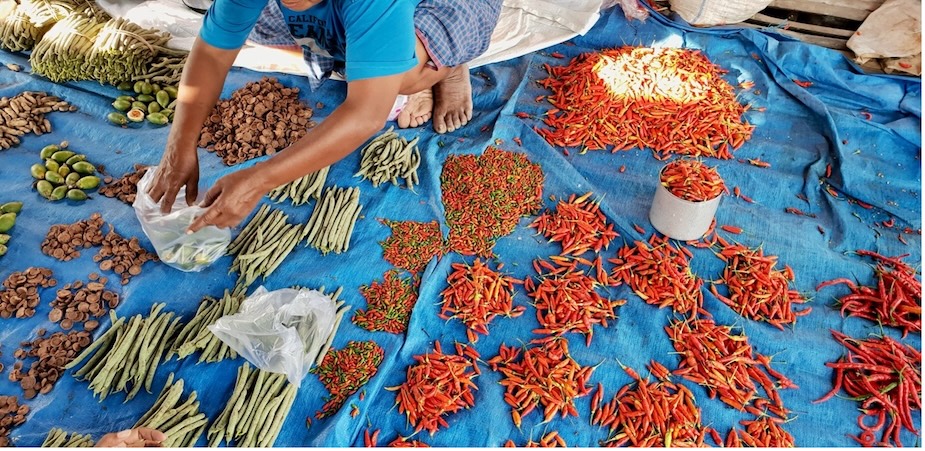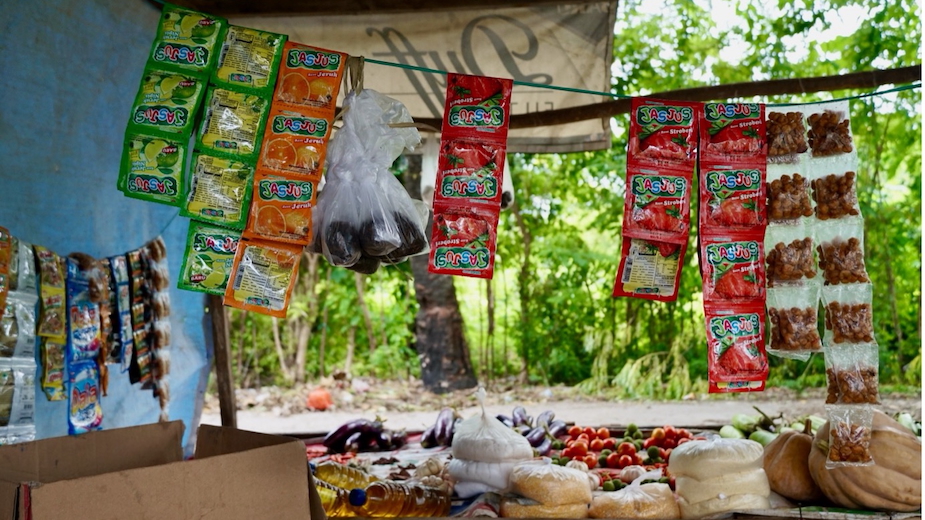Everyday acts of living together in West Timor
On a late morning in 2022, I balanced on the back of a friend’s motorbike as we wound our way through the dusty streets of Atambua Selatan, West Timor, toward the weekly market. By the time we parked, the market was already bustling. Stalls spilled out along the roadside, little mounds of colour spread on tarpaulin mats: bright red chillies, stacked beside earth-coloured dried betel nuts, green betel fruits and pepper stalks, and spring onions tied in neat bundles with string.
Women called out to one another, bargaining and chatting, their voices folding together in Tetum, Dawan, and Indonesian. Some swapped produce or exchanged large notes for smaller change; others shared a joke or news about children who had moved away. The overlapping voices grew louder as we made our way in, sellers calling out their offers. At one stall, we bought a bag of betel nuts. When the seller recognised my friend, who had spent part of her childhood here among other East Timorese families who had resettled in the area, the seller smiled and slipped an extra handful into a separate bag for her parents.
As we left the market, my friend pointed out that in 1999, the dusty field where women now sell their produce was crowded with tents. After the referendum that ended Indonesia’s 24-year occupation of present-day Timor-Leste, violence swept through the territory and more than 240,000 people fled across the border into West Timor. Most displaced people eventually returned home after Timor-Leste’s independence in 2002, but many, like my friend and her family, never did.
Two decades later, those who stayed have built lives here. For some, returning is impossible: they have married, raised children, or carry histories that tie them to this side of the border.
This story is about how, long after the violence, East Timorese families and their Indonesian neighbours have learned to share streets, markets, and social life – making ‘living together’ an ordinary, daily practice, rather than a single political event.

Over years of research with East Timorese diasporic communities in West Timor towns like Atambua, Kefamenanu and Kupang, I have come to see ‘living together’ as something built from small, ordinary acts. In the early years after 1999, violence, including the notorious militia attack on the UN office in Atambua, strained relations between the displaced and their hosts. Over time, however, the texture of everyday life began to shift.
East Timorese settlements are often built on the edges of towns, separate from local neighbourhoods. Some families still live in the refugee camps where they first arrived, while others have been moved to resettlement sites. A smaller number have settled inside local neighbourhoods. Where homes are closer together, everyday interaction between East Timorese and host population communities is more common, although a noticeable separation remains in how and where people spend time with one another.
Markets are one of the clearest places where interaction occurs. Many older East Timorese who settled in Kupang came from the eastern parts of Timor-Leste, where Tetum and Indonesian were rarely spoken. Older women I spoke with often said that, at first, this language gap made buying and selling awkward, but over time, they learned to bargain in Indonesian, sometimes earning warm praise from local vendors for their efforts.
Living together also extends beyond trade. Because land ownership is closed to newcomers, many East Timorese farm through crop-sharing arrangements with local landowners. Neighbours lend farming tools, share rice in lean harvest seasons, attend weddings when invited, and turn up at funerals.

In West Timor, my research has focused on the lived experiences of ageing and displacement. Listening to older East Timorese men and women reflect on their lives as their time horizons narrow offers insight into how the passing of time reshapes perspectives and recalibrates priorities.
Many of the people I spoke with were aged over 60, the threshold used by the World Health Organisation and the Indonesian government to designate ‘older’ age for health and welfare programmes. For these people, old age does not mean retirement. Many continue to work out of necessity, often as the primary or sole income earners for their families. For those more advanced in age who have remained in West Timor, the need to rely on others has become more immediate. Many can no longer walk long distances or ride motorbikes, so family members or neighbours help with transport to markets, churches, and clinics.
Catholic churches often provide home visits for the most vulnerable residents, community health centres (puskesmas) run mobile outreach clinics for older adults (posyandu lansia) at the neighbourhood (RT/RW) level or in other easily accessible community venues, such as village halls or private homes. These services reach both East Timorese and non–East Timorese residents. While they offer valuable opportunities for interaction, attendance by the latter is often low.
As bodies slow, so do routines. These older adults spend more time at home, providing care for grandchildren and telling them stories about life before displacement. Younger generations, meanwhile, grow up playing and going to school with non-East Timorese neighbours.
Older women sell vegetables, woven cloth, or cooked food from small roadside stalls, often next to their Indonesian neighbours. Conversations over slow afternoons become a way of passing time together. In these spaces, where different communities and generations come together, the sharp identities of the past become blurred. Ageing has created a different rhythm in which the demands of daily life and social harmony take precedence.
These ties, however, are not without friction. Youth conflicts are often blamed on East Timorese groups and their martial arts affiliations. Religious differences add further complications: Catholic East Timorese are wary of programmes run through West Timorese Protestant churches, such as health outreach or kindergartens, and many families choose to opt out entirely. When fights among young people occur, community elders from both sides work together to guide and mediate, helping to ease tensions and maintain a fragile coexistence.
Yet life goes on. East Timorese and Indonesian neighbours learn to live side by side because survival depends on it. Small, often unspoken gestures, like sharing water, mingling at the market, or turning up for a funeral, form what might be called ‘micro-practices of coexistence’. They rarely make headlines, but for those who can no longer return to Timor-Leste, they are the fabric of life in West Timor.
Victoria Kumala Sakti is a lecturer and research associate at the Department of Social and Cultural Anthropology, University of Münster.












